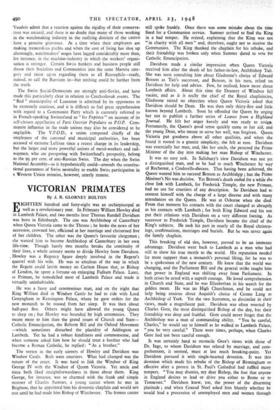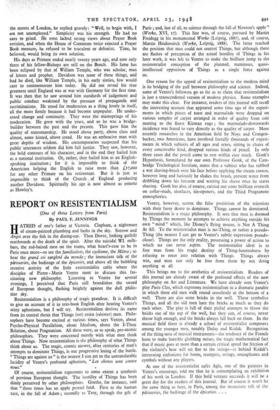VICTORIAN PRIMATES
By J. R. GLORNEY BOLTON EIGHTEEN hundred and forty-eight was an archiepiscopal as
• well as a revolutionary year. In February William Howley died • in Lambeth Palace, and two months later Thomas Randall Davidson was born in Edinburgh. The one was Archbishop of Canterbury when Queen Victoria came to the Throne ; he broke the news of her accession, crowned her, officiated at her marriage and christened five of her children. The other was the Queen's favourite clergyman ; she wanted him to become Archbishop of Canterbury in her own life-time. Though barely two months breaks the continuity of their lives, a whole century seems to divide Howley from Davidson. Howley was a Regency figure deeply involved in the Regent's quarrel with his wife. He was so emulous of the way in which the Regent could lavish money on Carlton House that, as Bishop of London, he spent a fortune on enlarging Fulham Palace. Later, as Primate, he remodelled most of Lambeth Palace and made it virtually uninhabitable.
. He was a fussy and ceremonious man, and on the night that King William died in Windsor Castle he had to ride with Lord Conyngham to Kensington Palace, where he gave orders for the new monarch to be roused from her sleep. It was then about half-past five. Others might have allowed the young Queen to sleep on ; but Howley was bounded by high ceremonies. They meant more to him than the grand issues of Church and State— Catholic Emancipation, the Reform Bill and the Oxford Movement —which sometimes disturbed the placidity of Addington or Lambeth. Yet he had a robust kindliness and commonsense, and when someone asked him how he should treat a brother who had become a Roman Catholic, he replied: " As a brother."
The vortex in the early careers of Howley and Davidson was Windsor Castle. Both were courtiers. What had changed was the nature of the court. It was hard to link the Windsor of King George IV with the Windsor of Queen Victoria. Yet uncle and niece both liked straightforwardness in those about them. King George, for instance, was so charmed with the frank and simple manner of Charles Sumner, a young curate whom he met in Brighton, that he appointed him his domestic chaplain and would not rest until he had made him Bishop of Winchester. The former curate still spoke frankly. Once there was some mistake about the time fixed for a Communion service. Sumner arrived to find the King in a bad temper. He retired, explaining that the King was not " in charity with all men " and, therefore, ought not to receive the Communion. The King thanked the chaplain for his rebuke, and their friendship was broken only when Sumner dared to vote for Catholic Emancipation.
Davidson made a similar impression when Queen Victoria received him after the death of his father-in-law, Archbishop Tait. She was soon consulting him about Gladstone's choice of Edward Benson as Tait's successor, and Benson, in his turn, relied •on Davidson for help and advice. Few, he realised, knew more about Lambeth affairs. About this time the Deanery of Windsor fell vacant, and as it is really the chief of the Royal chaplaincies, Gladstone raised no objection when Queen Victoria asked that Davidson should be Dean. He was then only thirty-five and little known beyond Lambeth. Soon he offended the Queen by urging her not to publish a further series of Leaves from a Highland Journal. He felt her anger keenly and was ready to resign. Fortunately, the Queen's good sense quickly came to her aid, and the young Dean, who meant to serve her well, was forgiven. Queen Victoria put goodness above all other qualities, and when she found it rooted in a granite simplicity, she felt at ease. Davidson was essentially her man, and, like her uncle, she pestered the Prime Minister of the day into making her man Bishop of Winchester.
It was no easy task. In Salisbury's view Davidson was not yet a distinguished man, and so he had to reach Winchester by way of Rochester, a Cinderella-diocese. That having been achieved, the Queen wanted him to succeed Benson as Archbishop ; but the Prime Minister's No was decisive. Yet Benson's death ended for a while the close link with Lambeth, for Frederick Temple, the new Primate, had no use for courtiers of any description. So Davidson had to content himself with the charge of a large diocese and with many attendances on the Queen. He was at Osborne when she died. From that moment his contacts with the court changed as abruptly as his contacts with Lambeth ; for both King Edward and his son put their relations with Davidson on a very different footing. As successor to Frederick Temple, Davidson became the chief of the King's subjects: He took his part in nearly all the Royal christen- ings, confirmations, marriages and burials. But he was never again the family chaplain.
This breaking of old ties, however, proved to be an immense advantage. Davidson went back to Lambeth as a man who had still to show his true mettle to the world. His reputation needed far more support than a monarch's personal liking, for he was to be a spokesman of the new century. He knew that the world was changing, and the Parliament Bill and the general strike taught him that power in England was shifting away from Parliament. In both crises he acted with a superb courage. He loved comprehension in Church and State, and he was Elizabethan in his search for the golden mean. He was no High Churchman, and he could not help being anxious about Asquith's choice of Cosmo Lang as Archbishop of York. Yet the two Scotsmen, so dissimilar in their views, made a magnificent pair. Davidson was often worried by Charles Gore, the most distinguished Bishop of the day, but their friendship was deep and fruitful. Gore could never forget that the Archbishop was a man of commanding ability. " You be careful, Charles," he would say to himself as he walked to Lambeth Palace, " you be very careful." There were times, perhaps, when Charles Gore had not been careful enough.
It was certainly hard to reconcile Gore's views with those of Dr. Inge, to whom Davidson was related by marriage, and com- prehension, it seemed, must at last reach breaking-point. • Yet Davidson pursued it with single-hearted devotion. It was this devotion which made his rebuke of the Bishop of Birmingham so effective after a protest in St. Paul's Cathedral had ruffled many tempers. " You may dismiss, my dear Bishop, the fear that anyone in England desires to lead or drive you either to Rome or to Tennessee." Davidson knew, too, the power of the disarming platitude ; and when Conrad Noel asked him bluntly whether he .would lead a procession of unemployed men and women through the streets of London, he replied gravely: "Well, to begin with, I am not unemployed." Simplicity was his strength. He had no axes to grind. He even lacked strong views about Prayer Book revision, and when the House of Commons twice rejected a Prayer Book measure, he refused to be truculent or defeatist. Time, he believed, would bring its own solution.
His days as Primate ended nearly twenty years ago, and now only three of his fellow-Bishops are still on the Bench. His fame has been eclipsed by that of William Temple, who was scholar, man of letters and prophet. Davidson was none of these things, and had he died, like William Temple, in his early sixties, few would care to commemorate him today. He did not reveal his true greatness until England was at war with Germany for the first time. It was then that he saw around him standards of judgement and public conduct weakened by the pressure of propaganda and recriminations. He stood for moderation as a thing lovely in itself, all the more firmly because it had become unpopular. He under- stood change and continuity. They were the mainsprings of his moderation. He grew with the years, and so he was a bridge- builder between the past and the present. This gave him the quality of statesmanship. He stood above party, above class and almost, some hinted, above creed. He was an embracive man with great depths of wisdom. His contemporaries suspected that his public utterances seldom did him full justice. They saw, however, the bold contours of his character, and in the end they hailed him as a national institution. Or, rather, they hailed him as an English- speaking institution; for it is impossible to think of the Americans helping the English to raise more than LTh000 for any other Primate on his retirement. But it is just as impossible to think of the Church _ of England producing another Davidson. Spiritually his age is now almost as remote as Howley's.



































 Previous page
Previous page